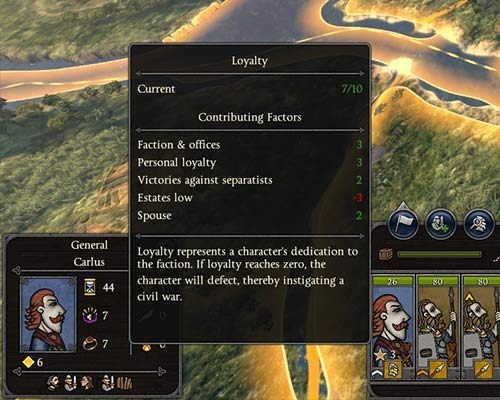Total War Saga Thrones of Britannia: Loyalty of characters
Last update:
Each character in the game is described by a number of factors, but the character's loyalty has a significant impact on the gameplay. Loyalty determines the devotion of a given character to the current leader of the faction. The higher the better. On the other hand, a low value is a time-bomb of unpleasant consequences.
If loyalty drops below 3 points, the situation starts to be quite critical. The game will automatically inform you about this state of affairs. This is not the end of the world, but the character will be more likely to rebel or act against the ruler. If this state of affairs persists or loyalty drops to zero, then in the next turn such a character will openly rebel against the ruler. This is a very undesirable situation, because not only do you lose a member of the court, but you also have to face an army inside your territory.
A civil war breaks out when one of your characters betray you., then a civil war breaks out. If he was a general, he appears somewhere on the map with his army. A governor gains control over a province's capital automatically and he gets an army that consists of the garrison that was inside that settlement. This is a special type of rebellion. It differs from the usual rebels due to a different flag and name. A separate, unique faction appears and is waging war against its previous ruler. Other states must declare war on such factions (they cannot be attacked without affecting relations with others, as with ordinary bandits). You can force or ask other kingdoms for help, or give help to such rebels yourself (when you want to, e.g. weaken your neighbour).

How to increase loyalty:
- The easiest way is to select the "Secure Loyalty" action (on the Intrigue panel in the faction tab). This way, you will usually gain two loyalty points. Sometimes you will have to sacrifice an influence point, some money or add an additional negative trait to an indicated character. It is worth having a little more money than the cost of the action itself, in order to counteract the reaction of the subject,
- Assigning an estate positively affects loyalty, although you also add influence this way. If the ruler has a lot of personal estates, all the characters in the court automatically receive a penalty to loyalty,
- Choosing an appropriate wife (some even offer +2 loyalty points),
- Some of the additional and acquired traits add/subtract loyalty points,
- Developing the "Priest" follower allows you to gain up to 5 loyalty points,
- Assigning special functions at your court, i.e. King's Captain, Chamberlain, Justiciar,
- Declaring an heir to the throne. Usually, it will not meet with a positive reaction of the rest of the family, and especially the previous successor.
- Avoid adoptions when you already have children because they will suffer a loyalty decrease due to increased competition for the throne.
- Some events, faction traits, and technologies add a loyalty bonus.
- Increase the level of influence of the faction leader. A low level negatively affects the loyalty of the subjects, but a high rate of influence provides additional loyalty points to all characters in the kingdom.
- Fighting rebels or separatists strengthens loyalty.
Maintaining loyalty is not difficult, but the more characters there are in your kingdom, the harder it is to control everyone. The growing territory of the state will begin to cause problems (every character wants to own an estate). Carefully observe the loyalty values and focus on the characters with the lowest loyalty. This way, you will avoid trouble and rebellions. Characters with high loyalty do not bring any additional benefits, apart from unshakeable devotion.
- Total War Saga: Thrones of Britannia Game Guide
- Total War Saga Thrones of Britannia: Game guide
- Total War Saga Thrones of Britannia: Characters
- Total War Saga Thrones of Britannia: Introduction for characters
- Total War Saga Thrones of Britannia: Statistics of characters
- Total War Saga Thrones of Britannia: Loyalty of characters
- Total War Saga Thrones of Britannia: Influence of characters
- Total War Saga Thrones of Britannia: Skills & Abilities of characters
- Total War Saga Thrones of Britannia: Intrigue, Family, and Statesmen of characters
- Total War Saga Thrones of Britannia: Characters
- Total War Saga Thrones of Britannia: Game guide
You are not permitted to copy any image, text or info from this page. This site is not associated with and/or endorsed by the developers and the publishers. All logos and images are copyrighted by their respective owners.
Copyright © 2000 - 2026 Webedia Polska SA for gamepressure.com, unofficial game guides, walkthroughs, secrets, game tips, maps & strategies for top games.
